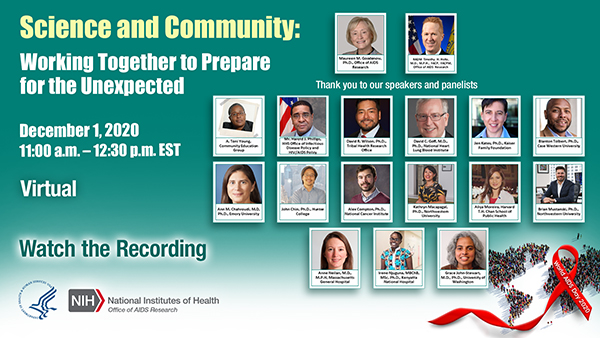Letters from the Director: NIH/OAR 2020 World AIDS Day Observance
Left to right:
First row: Dr. Maureen M. Goodenow and Dr. Timothy H. Holtz
Second row: Ms. A. Toni Young, Mr. Harold J. Phillips, Dr. David R. Wilson, Dr. David C. Goff, Dr. Jen Kates, and Dr. Blanton Tolbert
Third row: Dr. Ann Chahroudi, Dr. John Chin, Dr. Alex Compton, Dr. Kathryn Macapagal, Ms. Aliya Moreira, and Dr. Brian Mustanski
Fourth row: Dr. Anne Neilan, Dr. Irene Njuguna, and Dr. Grace John-Stewart
Despite the unprecedented challenges we faced in 2020, the National Institutes of Health (NIH) observed World AIDS Day on December 1, continuing—and perhaps expanding—the annual recognition of global efforts to end the HIV pandemic. The NIH theme, “Science and Community: Working Together to Prepare for the Unexpected,” was timely, highlighting the vital role that partnerships have played in advancing science for both the HIV and the COVID-19 pandemics.
HIV progress has been spearheaded by collaborative efforts between science and community stakeholders over the past 40-years, since HIV was first identified. While at times this relationship has been tumultuous, we have grown together in mutual appreciation and advancement and, in so doing, catalyzed the process of scientific collaboration to improve public health outcomes. These lessons learned are integral for the COVID-19 response, as the HIV community well recognizes.
The OAR hosted the NIH World AIDS Day observance on a virtual platform—the NIH VideoCast service—for the first time and simultaneously livestreamed the program for the public. The program focused on community partnerships and the importance of building the capacity of current and future generations of HIV researchers and advocates.
Distinguished speakers and panelists joined the occasion to explore new opportunities to work together to identify emerging challenges and solutions. The participants represented a broad mosaic of perspectives and included NIH leaders; extramural and intramural researchers; community advocates; policy experts; and early career researchers, whose voices brought fresh viewpoints and continue to strengthen the HIV research pipeline.
Three presentations, preceding a panel discussion, touched on a wide range of topics, including the NIH Centers for AIDS Research and AIDS Research Centers, which work with local governments and community organizations to design and implement interventions to rapidly drive down HIV incidence, the primary goal of the Ending the HIV Epidemic initiative; the development of culturally relevant research essential to improving American Indian/Alaska Native health and expanding research capacity; research toward an HIV cure; blood safety; and a randomized trial, Reprieve, to prevent vascular events in HIV.
Ms. A. Toni Young, who is the Executive Director of the Community Education Group, served as the program moderator and introduced the participants:
Speakers
- Harold J. Phillips, Senior HIV Advisor and Chief Operating Officer of the Ending the HIV Epidemic, U.S. Department of Health and Human Services, Office of Infectious Disease and HIV/AIDS Policy (provided a prerecorded message)
- David R. Wilson, Ph.D., Director of the Tribal Health Research Office, NIH
- David C. Goff, M.D., Ph.D., Director, Division of Cardiovascular Sciences, National Heart, Lung, and Blood Institute, NIH
Co-Chairs
- Jennifer (Jen) Kates, Ph.D., M.A., M.P.A., Vice President and Director, Global Health and HIV Policy, Kaiser Family Foundation, Outgoing Chair of the Office of AIDS Research Advisory Council (OARAC)
- Blanton S. Tolbert, Ph.D., Professor, Case Western Reserve University, Incoming Chair of OARAC
Panelists
- Ann M. Chahroudi, M.D., Ph.D., Emory University
- John Chin, Ph.D., M.S., Hunter College
- Alex Compton, Ph.D., Retroviral Replication Laboratory, HIV Dynamics and Replication Program, National Cancer Institute
- Grace John-Stewart, M.D., Ph.D., University of Washington
- Kathryn Macapagal, Ph.D., Northwestern University
- Aliya Moreira, Harvard T.H. Chan School of Public Health
- Brian Mustanski, Ph.D., Northwestern University
- Anne Neilan, M.D., M.P.H., Massachusetts General Hospital
- Irene Njuguna, M.B.Ch.B., M.Sc., Ph.D., Kenyatta National Hospital
Throughout the discussion, panelists shared details about their research and thoughts on how to build HIV research capacity through the development of infrastructure; workforce; partnerships with community organizations; and increased support to address diversity, health disparities, and other gaps in research.
During the event’s close, the OAR Deputy Director, Rear Admiral Timothy H. Holtz, M.D., M.P.H., FACP, FACPM, underscored the discussions’ key points:
- Improve data collection processes to address systemic inequities and health disparities;
- Establish clear, consistent, and unified communications to renew public trust in science research;
- Further develop telemedicine and point-of-care modalities to address HIV, COVID-19, and emerging diseases;
- Support new ways to advance the careers of early stage investigators; and
- Renew the focus on basic research and discovery for HIV.
The event concluded with a special slide tribute to honor the legacies of some of the HIV visionaries and heroes who were lost during the past year.
I encourage you to view the video “NIH World AIDS DAY 2020, Science and Community: Working Together to Prepare for the Unexpected,” listen to the rich presentations and discussion, and share the video with your colleagues and communities.
To learn more about the agenda, speakers, and panelists, visit the World AIDS Day 2020 webpage on the OAR website, and click on Participant Biographies.
Maureen M. Goodenow, Ph.D.
Associate Director for AIDS Research and
Director, Office of AIDS Research
National Institutes of Health
This page last reviewed on January 7, 2026


